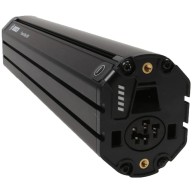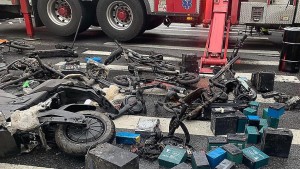Is your bike's battery safe?
The batteries of electric bikes and scooters are under scrutiny due to the recurring fires that are frequently reported in the press. In Madrid, after a scooter fire burned a Metro wagon, access to these vehicles has been banned on public transport, a move that has received strong criticism from personal mobility vehicle user associations, which in turn have received the support of urban cycling associations in anticipation of being next on the list.

Electric bike and scooter batteries under scrutiny
A few months ago we were talking about the safety problem that fires caused by electric bicycle batteries in New York City had become, and even the prohibition of this type of vehicles was being considered. A problem that is also beginning to take shape in Europe as the use of electric bicycles and scooters in our cities increases.
In fact, a statistic from the insurer Zurich for the city of London pointed out that in 2022 there were 167 fires caused by this in the city. A figure that, although it seems high, only affects 0.011% of the vehicles in circulation. However, it should be noted that, due to the nature of the fires caused by lithium combustion, extremely difficult to extinguish and very violent in behavior, they often cause serious and spectacular effects.
RECOMENDADO

Complete list of the highest paid cyclists of 2025

How many calories are burned when cycling

What is heart rate variability and how does it affect the cyclist?

Change wheels if you want to transform your bike's behavior

What bike size do you need? Here's how to find out

How does age affect performance and recovery?

This has caused the concern of many users who store and charge their electric bikes and scooters at home, where a fire could result in catastrophic consequences. However, it should be noted that fires are often associated with modifications made by the user, either with higher capacity batteries of dubious origin, manipulation of them or the modification of the ebike or scooter to, for example, avoid the assistance cut-off that is legally set at 25 km/h. If your ebike or scooter remains with a factory configuration, the manufacturer will have had to pass a homologation that grants the CE certificate, which implies that the product has passed the various safety standards set by the European Union.
The batteries of electric bicycles and scooters are made up of lithium cells, which are like small individual batteries similar in appearance to traditional batteries. These cells are joined together by metal pieces, some in series to achieve the desired nominal voltage and others in parallel to achieve the desired total capacity; and the whole assembly is placed in a structure that will keep the assembly fixed within the casing.

In turn, the cell assembly is connected to an electronic management unit or BMS (Battery Management System) that is responsible for cutting off the energy flow when the capacity drops below a level, maintaining a stable energy supply and cutting off the electricity supply during charging when the battery is at its maximum capacity. Undoubtedly the indispensable element in the safety of batteries.
Finally, these are surrounded by an external casing that usually has protective elements on its interior to prevent the battery from being damaged in case of an impact. All this is duly homologated, passing various tests that mark the protocols set by the European Union that guarantee that they are safe.
So, why do fires occur? As we explained earlier, usually because of the user who either modifies the factory configuration of their electric bike or scooter or buys units, either the complete vehicle or just the battery through the internet from brands without the proper homologations and with a quality that is at least dubious.

It is not uncommon, especially for those who make intensive use of their ebikes and scooters, to look for greater battery capacity, buying cheap units on the internet that are manufactured with low-quality cells or that have a BMS with very limited capabilities if they do not directly dispense with it. The extreme is those who directly buy lithium cells to build their own batteries or extend the autonomy of theirs. It is precisely these actions that are the causes of the majority of fires in electric bicycles and scooters.
If you have purchased your e-bike from a recognized manufacturer you should not worry, although it never hurts to take the precautions repeated ad nauseam such as not exposing the batteries to excessive heat, keeping them monitored during charging and disconnecting them at the end of it or, in case of having suffered a fall, having our bike checked to rule out that there have been damages to the battery.